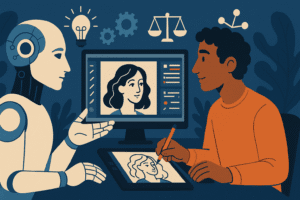
You tell your phone to set a timer. You ask your smart speaker for the weather forecast. For years, we’ve interacted with AI assistants that respond to our commands. But what if your AI did more than just respond? What if it understood your goals and worked tirelessly in the background to achieve them, anticipating your needs, managing complex tasks, and acting on your behalf without constant supervision? This isn’t science fiction; it’s the dawn of the autonomous AI agents, a technological leap poised to redefine productivity and our very relationship with machines. Forget simple command-and-response; we are entering the era of the digital teammate.
What Exactly Are AI Agents?
At its core, an AI agent is a system that can perceive its environment, make decisions, and take autonomous actions to achieve specific goals. While this might sound similar to the AI assistants we use today, the key difference lies in the word “autonomous.” An AI assistant like Siri or Alexa is reactive; it waits for a direct command and executes a single, predefined task. An AI agent, on the other hand, is proactive. It is given a high-level objective and can independently devise and execute a multi-step plan to reach it. Think of it as the difference between asking a junior assistant to “book a flight to New York” versus telling your seasoned executive assistant to “arrange my business trip to New York for the conference next month.” The latter involves research, comparison, scheduling, booking, and problem-solving—all handled independently. These powerful systems are designed with three core components: a perception module to process data (like text, images, or code), a “brain” (often a large language model) for reasoning and planning, and an action module to interact with other software and systems through APIs.
Real World Applications Transforming Industries
The theoretical promise of AI agents is already translating into tangible applications across various sectors. The most headline-grabbing example is in software development. Companies are building agents that can take a simple prompt in plain English and autonomously write, debug, and even deploy entire applications. The announcement of Devin, touted as the first AI software engineer, showcased an agent completing real-world coding jobs from start to finish, a feat that signals a massive shift in how software will be created. As tech journalists and analysts have noted, the race to build truly capable agents is heating up. Industry analysts are taking note, with predictions like Gartner’s forecast that AI assistants will become standard tools for the majority of software engineers. Beyond coding, AI agents are set to revolutionize customer service by proactively identifying and resolving issues before they escalate. In personal productivity, imagine an agent that manages your inbox, automatically summarizes important emails, schedules meetings by coordinating with the agents of your colleagues, and prepares a daily briefing tailored to your priorities. In e-commerce, these agents could act as the ultimate personal shopper, scouring the web, comparing products based on your deep preferences, and even negotiating for better prices on your behalf.
The Technology Powering Autonomous Agents
The recent explosion in the capabilities of AI agents is not accidental; it’s built upon the convergence of several key technologies. The most crucial element is the Large Language Model (LLM), such as those in the GPT family. LLMs provide the sophisticated reasoning, comprehension, and planning capabilities that serve as the agent’s cognitive engine. They allow the agent to understand complex, ambiguous goals and break them down into logical, actionable steps. However, a brain is useless without a body. This is where Application Programming Interfaces (APIs) come in. APIs act as the agent’s hands and feet, allowing it to connect to and control other software, websites, and digital tools. By using APIs, an agent can send an email, book a flight, search a database, or execute code. The final piece of the puzzle is memory. For an agent to be truly effective, it must learn from its experiences. This is achieved through sophisticated memory architectures, often involving vector databases, which allow the agent to store and retrieve past interactions, user preferences, and successful strategies, enabling it to improve its performance over time.
Navigating the Challenges and Ethical Questions
As with any transformative technology, the rise of AI agents brings a host of challenges and ethical dilemmas that we must address thoughtfully. Security is a primary concern. If an agent has the autonomy to access bank accounts, corporate systems, and personal data, a hacked agent could cause unprecedented damage. This necessitates a new frontier in cybersecurity focused on securing autonomous systems. Closely related is the question of accountability. If an AI agent makes a costly mistake, who is responsible? Is it the user who deployed it, the company that built it, or the developers who wrote the code? Clear legal and ethical frameworks will be essential. Furthermore, the potential for job displacement is very real. While agents may augment human capabilities, tasks that are repetitive or involve digital coordination are ripe for automation. Society must plan for this transition through education, reskilling programs, and a re-evaluation of the nature of work. Finally, data privacy is paramount. These agents, by design, will have access to an incredible amount of our personal and professional information. Ensuring this data is used ethically and protected securely will be one of the most significant hurdles in earning public trust. As experts from institutions like the Stanford Institute for Human-Centered AI point out, building this future responsibly is as important as building the technology itself. The journey toward a world populated by autonomous AI agents is just beginning, and the landscape is evolving at a breathtaking pace. These systems are far more than just glorified chatbots; they are the next step in human-computer interaction, shifting the paradigm from direct instruction to goal-oriented delegation. The potential for increased productivity, innovation, and convenience is immense. However, realizing this potential depends on our ability to navigate the significant security, ethical, and societal challenges ahead. The future of work isn’t about being replaced by AI, but rather about being augmented by it. Learning to collaborate with these powerful new digital teammates will be the defining skill of the coming decade, unlocking capabilities we are only just beginning to imagine.
References
1. Stanford Institute for Human-Centered Artificial Intelligence (HAI). “Foundation Models and the Future of AI Agents.” Available at: https://hai.stanford.edu/news/foundation-models-and-future-ai-agents
2. Cognition. “Introducing Devin, the first AI software engineer.” Available at: https://www.cognition-labs.com/introducing-devin
3. Wiggers, Kyle. “The race to build AI agents is on.” TechCrunch. Available at: https://techcrunch.com/2024/03/23/the-race-to-build-ai-agents-is-on
4. Gartner. “Gartner Predicts 75% of Enterprise Software Engineers Will Use AI Code Assistants by 2028.” Available at: https://www.gartner.com/en/newsroom/press-releases/2023-05-23-gartner-predicts-75-percent-of-enterprise-software-engineers-will-use-ai-code-assistants-by-28
5. NVIDIA Blogs. “What Are Autonomous Agents?” Available at: https://www.nvidia.com/en-us/glossary/autonomous-agents





